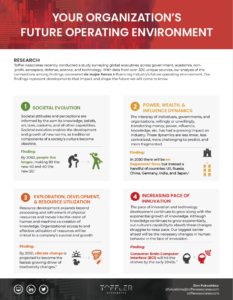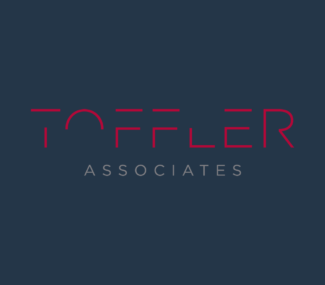Your Organization’s Future Operating Environment

 Toffler Associates recently conducted a study that surveyed global executives and found six major forces that are influencing industry’s future operating environment. These forces provide insight into what is causing change in your environment and for your organization, and what your organization needs to understand and plan for. Our findings represent developments that will impact and shape the future we will come to know. You can download the infographic here. Keep reading to learn more!
Toffler Associates recently conducted a study that surveyed global executives and found six major forces that are influencing industry’s future operating environment. These forces provide insight into what is causing change in your environment and for your organization, and what your organization needs to understand and plan for. Our findings represent developments that will impact and shape the future we will come to know. You can download the infographic here. Keep reading to learn more!
1. Societal Evolution
Societal attitudes and perceptions are informed by the sum its knowledge, beliefs, art, laws, customs, and all other capabilities. Societal evolution enables the development and growth of new norms, as traditional components of a society’s culture become obsolete.
Finding: By 2060, people live longer, making 80 the new 40 and 40 the new 20.1
2. Power, Wealth, and Influence Dynamics
The interplay of individuals, governments, and organizations, willingly or unwillingly, transferring money, power, influence,
and knowledge has had a growing impact on industry. These dynamics are less linear, less centralized, more challenging to predict, and more fragmented.
Finding: In 2030 there will be no hegemonic force but instead a handful of countries: US, Russia, China, Germany, India, and Japan.2
3. Exploration, Development, and Resource Utilization
Resource development expands beyond processing and refinement of physical resources and moves into the realm of human and machine co-creation of knowledge. Organizational access to and effective utilization of resources will be critical to a company’s survival and growth.
Finding: By 2050, climate change is projected to become the fastest growing driver of biodiversity changes.3
4. Increasing Pace of Innovation
The pace of innovation and technology development continues to grow along with the exponential growth of knowledge. Although
knowledge continues to grow exponentially, our culture’s capability to absorb these changes struggles to keep pace. Our biggest barrier ahead will be the necessary changes in human behavior in the face of innovation.
Finding: Consumer Brain Computer Interface (BCI) will hit the shelves by the early 2040s.4
5. Application of Data
Society increasingly demands technology that demonstrates a direct impact on quality, efficiency, and effectiveness of life. Therefore, there is an increasing need for analytic tools that enable the breadth of the connected environment, analyzing large amounts of data to support decision making. The value that existed in the technical product has shifted to data collection, processing, and application.
Finding: By 2050, 95% of all fatal traffic accidents have been eliminated globally and 3D printing technology will be used for growing artificial organs.5
6. Transforming Infrastructure
The connection between what is traditionally considered infrastructure, people, sensors, and networks is not only increasing in
volume, but also in complexity. This is further compounded by the need to balance the development of the new while
simultaneously protecting the integrity of our aging, traditional structures.
Finding: In 50 years, the majority of people will live in cities, which will be increasingly more integrated with nature and plants. It will be standard for buildings to be covered in vegetation designed to filter out pollutants and retain CO2.6
Accounting for Change
These six forces provide insight into what is causing change in your environment, for your organization, and what your organization needs to understand and plan for. Consider these as you build your strategy:
- Pace and impact of disruption to knowledge and technology
- Predictability of innovation
- How and with whom people are connecting
- Movement of information between people and things
- Value people assign to different information, resources, products, and services
- Public perception of sources or providers of information, resources, products, and services
- Level of trust in traditional and non-traditional institutions
Questions you can ask yourself to better plan for change
- What type of workforce will enable your success in the face of change?
- How can you balance security (e.g. IP, cyber) with open collaboration and growth?
- What capital investments can be made that can mitigate risk and address potential opportunities?
- How can you engage your supply chain in times of rapid change?
- How can you proactively understand customer needs and shape experience?
Sources:
1. http://www.quantumrun.com/article/transitioning-longer-lived-society
2. https://www.forbes.com/sites/worldeconomicforum/2016/11/12/americas-dominance-is-over-by-2030-well-have-a-handful-of-global-powers/#7695bd4b57a7
3. http://www.oecd.org/env/indicators-modelling-outlooks/biodiversitychapteroftheoecdenvironmentaloutlookto2050theconsequencesofinaction.htm
4. http://www.quantumrun.com/macro-prediction/society-and-hybrid-generation-future-computers-p4
5. https://www.ericsson.com/thinkingahead/the-networked-society-blog/2014/09/08/a-day-in-the-life-year-2050/
6. https://www.bustle.com/articles/29803-what-will-the-world-be-like-in-50-years-19-futuristic-predictions
- Categories
- Futures and Foresight
- Workforce of the Future


 About the Authors
About the Authors